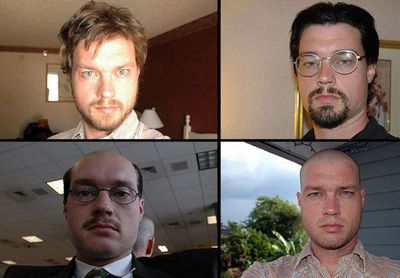A Wired Magazine writer tried to hide online. It didn’t work.
Journalist Evan Ratliff wondered how difficult it would be to disappear from society while profiling a criminal who faked his death for Wired Magazine. Ratliff challenged the public to follow his own digital trail, and was caught in 25 days by a stranger who infiltrated his social network to find his physical whereabouts.
He was in New Orleans. It turns out that you can run, but you can’t hide.
He’s a guest on MPR’s Midmorning and I’m looking for your comments about his story, possibly your story of trying to erase your steps online. Share them below.
10:01 a.m. – My colleague, Julia Schrenkler, just tweeted, “I remember reading about Ratliff’s experiment & thinking the avg person wouldn’t have an online community organized to find them.” But how long would it take to “organize” the online community? Isn’t it a bit like America’s Most Wanted? Who wants to volunteer to be found (or not)?
10:08 a.m. – His plan for the first week fell apart. He had planned to take Amtrak and found out that Amtrak’s ID requirements are pretty stringent. The solution was to take the bus around the country. You can blend in on the bus.
10:09 a.m. – “As you feel more and more isolated, you start to make little mistakes,” he said of people who try to disappear. He got the idea for doing this after writing the story of a man who faked his own death. Hiding out is exhausting. As he’s talking, I’m thinking of Sara Jane Olson, the St. Paul “soccer mom” who actually was a fugitive wanted in California. (Aside: It’s interesting that nobody has done a Sara Jane interview since her release from prison)
10:13 a.m. – People who try to disappear change their Social Security numbers, but usually only by 2 digits so it’ll be easy to remember. “People searching online know this.” They also receive mail at their old address under their new name.
10:16 a.m. – Caller Patrick from Minneapolis: “Is it possible to disappear without changing your name?”
“You need to use things like credit cards. You can’t get a job unless you’re working for cash, without a Social Security. If you’re willing to break the law and have good criminal contacts, you could probably just generate fake IDs (while keeping your real name),” Ratliff said. Greyhound is one of the few transportation options that doesn’t ask for ID, by the way.
10:21 a.m. – The different appearances Ratliff had on his run ….
Paul asks in the comment section, whether staying offline would make it harder for people to find you. That’s got me thinking of all the little bread crumbs we drop during the day that alerts others where we are. We’re not changing our name, of course, but we’re giving up our privacy. Make a credit card purchase, use an ATM, walk in downtown St. Paul. You can’t stay hidden. Or can you?
10:26 a.m. – Online writer says it’s usually insurance companies that keep on looking. “That’s absolutely true,” Ratliff says. “Insurance companies will go to the end of the earth to find somebody. They’ll sit on something quietly for years, because they know that eventually people will resurface.”
10:28 a.m. – Memo to self. Don’t try to fake your death near water. People think that’s the best way to disappear, Ratliff says, but it’s not.
10:30 a.m. – This guy went to a lot of trouble to fake his own death. But criminals make stupid mistakes. He didn’t put enough fuel in his airplane and he didn’t know the government would scramble fighter jets.
10:32 a.m. – Douglas of Minneapolis writes:
I disappeared back in 1991. I walked away from my bills, my job everything. I moved to Paris France and managed to stay about 6 weeks while searching for work both in Paris and London. Eventually my world crashed in on me. But what a wild ride.
(I’ll try to provide more details on this later today)
10:39 a.m. – I’m surprised it took a half hour to get to D.B. Cooper. Is there a more famous “disappearance”? He jumped out of a Northwest Airlines jet in 1971 with a bucketload of money in a hijacking and has never been found.
10:41 a.m. – How was Ratliff found? He used his Facebook page to get the the IP addresses of people visiting. He also knew Ratliff had a gluten-free diet, and he was “nabbed” at a gluten-free pizza joint. “I think to disappear in this society, in the digital age, you would have to change all of your habits.”
That’s today’s show. Ratliff speaks tonight at the Walker at 7 if you want to hear more.

